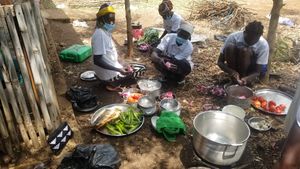Webinar on Cooking Energy in Displacement Settings
COOKING ENERGY IN DISPLACEMENT SETTINGS WEBINAR SERIES |

Safe and sustainable access to cooking energy in displacement settings is a persistent challenge for the humanitarian community. As a result, displaced populations are subject to protection, health, food security risks as well as conflict over natural resources, in addition to experiencing fuel shortages and gender inequalities. It is generally assumed that there are no energy markets in displacement settings, although displaced people around the world already spend more than $1.6 billion a year to light their homes and cook their food,1 as such there is a significant potential for private-sector engagement in this context, which could result in win-win scenarios for all stakeholders.2 A major constraint for increased private-sector engagement are gaps in knowledge, coordination and mutual understanding between private sector, development and humanitarian actors. Against this background, GIZ (ESDS and EnDev), GPA and MECS are co-organising a webinar series on Cooking Energy in Displacement Settings.
Webinar 1: Cooking Energy in Displacement Setting – Landscaping
7 July 2020, 14:00-15:30 CET (check your local time)
Registration link:
This webinar provides an overview of the stakeholder landscape of the humanitarian cooking sector and aims to improve mutual understanding as a basis for successful cooperation. It will shed light on their approach and what are their advocating for; success factors as well as common challenges in existing cooking energy interventions.
First in the series, this webinar will feature a presentation providing a lay of the land of the humanitarian cooking sector followed by a moderated panel discussion. To gain a holistic picture, speakers from humanitarian and development organisations, the private sector, policy consultancy and a community representative will participate in the panel.



















